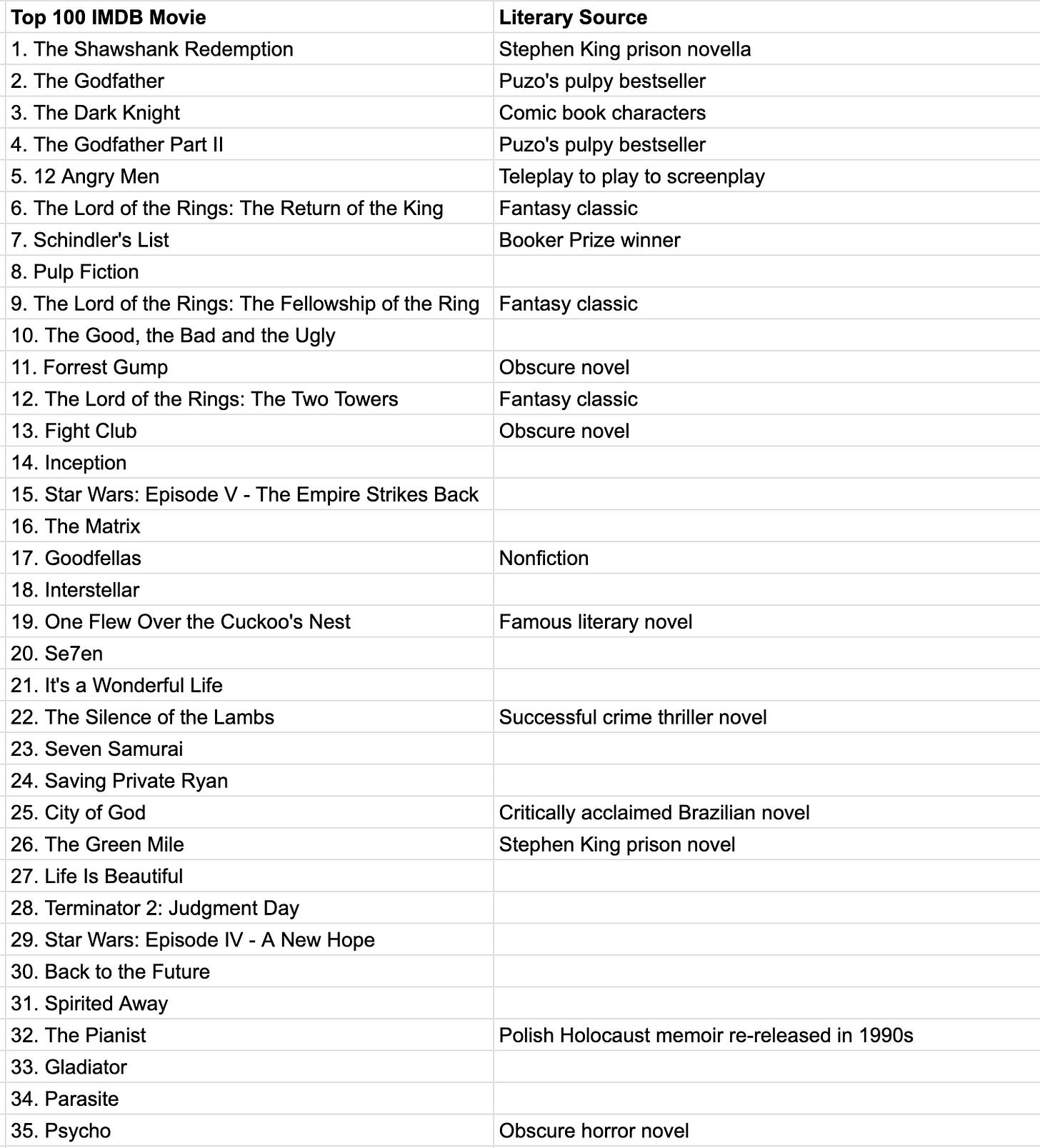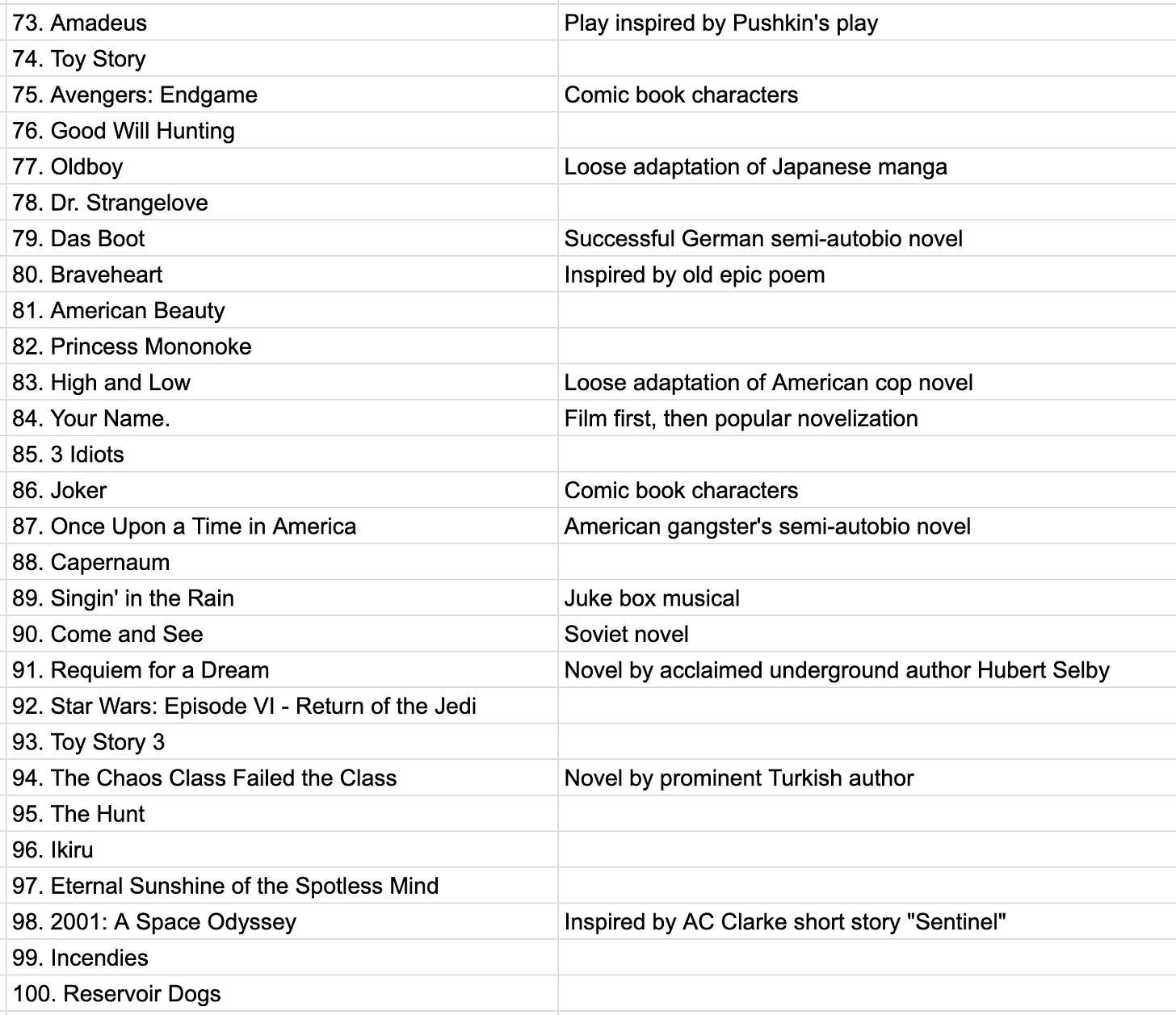In Contrast, How Many Famous Films Are Based on Famous Novels?
What were the literary sources, if any, for the top 100 movies?
Reversing my approach in my earlier post “Do Famous Novels Make Famous Films” in which I saw how many novels that made the 1998 Modern Library Top 100 list had been adapted into excellent films (a fair number, but perhaps less than you’d expect), today I’m starting with the Internet Movie DataBase top 100 rated films and then looking up their printed word sources.
As I mentioned, the IMDB film ratings are skewed toward the tastes of younger males who are really into rating things. So they are biased in favor of more recent movies and they are not all that elitist due to the huge sample sizes, up to 3 million one-to-ten ratings for a single movie. (In contrast, the the Modern Library Top 100 novels were skewed highbrow and toward the first half of the 20th Century).
But, still, IMDB’s list is a not unreasonable list of what younger male film enthusiasts have been into in this century. So, it’s interesting to see where filmmakers are getting their ideas for memorable movies.
Here’s IMDB’s top 100 and their printed sources, if any. If I leave blank the source, that means the story and screenplay were all made up by film industry professionals for this film. E.g., Pulp Fiction never appeared on pulp. Instead, it’s an original screenplay by Quentin Tarantino and Roger Avary.
I’ll put the last 65 movies and my notes and thesis below the paywall.
52 of the 100 don’t appear to have sources outside the film industry. (And that’s generously calling The Lion King “inspired by Hamlet.”)
Six are made up by professional screenwriters based on comic book characters. Oldboy is a loose South Korean adaptation of a Japanese manga.
The three Lord of the Rings movies are based on fantasy genre fiction, but note that Tolkien pretty much invented the rules of the fantasy genre.
Similarly, Dune ranks with Stranger In a Strange Land as perhaps the most famous science fiction genre novel of the 1960s.
Mario Puzo was going broke writing sensitive literary fiction so his wife recommended he wrote a bestselling potboiler with lots of gratuitous sex scenes to take advantage of the end of censorship. Puzo and FF Coppola then cut out almost all the hubba-hubba crud in their movie script … with historic results. So, the novel’s underlying story turned out to be a lot better than it had seemed.
Three of the top 100 films (The Shawshank Redemption, The Green Mile, and The Shining) are adapted from Stephen King stories.
What about literary novels?
Ken Kesey’s One Flew Over the Cuckoo’s Nest was a famous literary novel that became a famous award-winning movie. (Kesey went on to become the chief West Coast pied piper of LSD, which brought his literary career to an abrupt end.)
Thomas Keneally’s Schindler’s Ark wasn’t too famous as a novel, but it won lots of awards, including the big Booker Prize, before being made into a classic movie.
The outstanding Brazilian film City of God is based on a semi-autobiographical novel written by a mulatto, Paulo Lins, who grew up in the City of God favela. It was highly acclaimed by Brazilian book reviewers.
Sergio Leone’s gangster film Once Upon a Time in America is based on a semi-autobiographical memoir-novel written by gangster Harry Grey while he was locked up in Sing-Sing.
Not too dissimilarly, Goodfellas is based on Henry Hill’s semi-true-life story as told to crime reporter Nicholas Pileggi.
Das Boot is adapted from a novel by a PR man for the German navy who spent six weeks underseas.
The Pianist is also an as-told-to 1946 Holocaust survivor memoir that caused some legal wrangling when it was successfully re-published in the 1990s.
Amadeus was based on the play by Peter Shaffer that was based on the Rimsky-Korsakov opera that was based on Pushkin’s short 1830 play. Very classy names all the way through.
Saving Private Ryan is an original screenplay by Robert Rodat, but it was inspired by the books of bestselling historian Stephen Ambrose, who served as a consultant. Plus Spielberg employed heavyweight screenwriters Frank Darabont and Scott Frank to interview veterans and then do uncredited rewrites.
The amount of writing talent that Spielberg kept on retainer in his prime is now well known: for example, playwright Tom Stoppard had a hand in just about every Spielberg movie for 15 years, although his contributions to Schindler’s List consisted of only two things: telling Spielberg that Steven Zaillian’s script was great and didn’t need any rewrites; and when a potentially fatal hole in the plot was discovered in the middle of filming, Stoppard came up with the single line to reshoot differently that fixed the problem.
Billy Wilder’s Sunset Boulevard started out in the hopes that the studio would buy the rights to Evelyn Waugh’s Los Angeles novel The Loved One. But that fell through, so Wilder and I.A.L. Diamond wrote an original story. You can see what’s left of Sunset Boulevard’s roots in Waugh’s pet cemetery novel when William Holden, pursued by debt collectors, takes refuge in Gloria Swanson’s mansion and she assumes he is the man from the pet cemetery here to pick up her dead chimpanzee.
The lesson I’d take away from these somewhat random observations is that the movie business, with its big money, has traditionally attracted lots of its own literary talent. I suspect that screenwriters tend to be more respectful of literary novelists than they actually need to be.
On the other hand, you almost always have to put up with other people’s interventions in your writing.
Interestingly, Wilder, who earned the most writing and directing Oscar nominations before Woody Allen, almost always wrote screenplays with one or more co-authors. Despite his huge accomplishments, he needed another writer to get him going.
In contrast, virtually all literary novelists are auteurs working alone. My late friend Jerry Pournelle wrote his biggest sci-fi books with Larry Niven, and Neil Gaiman and Terry Pratchett have teamed up frequently for their fantasy novels.
But it’s remarkable how few famous novels have been written by partners.






Playwright/screenwriter David Mamet had a line summarizing the attitude of Hollywood producers towards the talent: "Film is a collaborative process. Now bend over."
Strange that there are no Coen Brothers movies on the list. In my mind the GOATs whatever the source material.